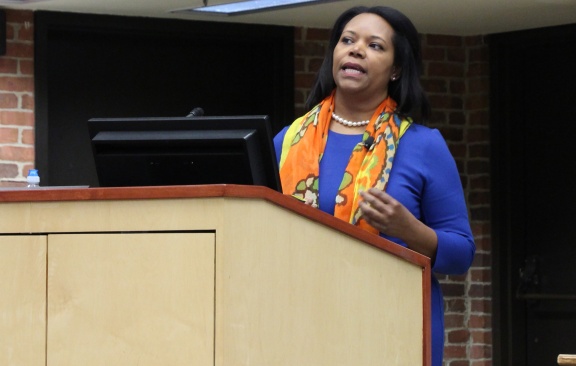NASHVILLE, Tenn. The Flexner Discovery Lecture Series was launched by Vanderbilt University Medical Center (VUMC) in 2011. Since then, it has featured the most eminent scientists from around the world, speaking on the highest impact research and policy issues in science and medicine.
On October 12, 2017, Meharry-Vanderbilt Alliance (MVA) Executive Director Consuelo H. Wilkins, MD, MSCI joined that number along with Joshua C. Denny, MD, MS, FACMI, a Professor from Vanderbilt’s Biomedical Informatics Department, and discussed “Propelling Precision Medicine and Its Promise of Health Equity.”
Emerging opportunities
“Precision medicine provides new opportunities to reduce disparities in health outcomes,” Dr. Wilkins explained at the outset. “To be successful in this endeavor, though, we really have to address some of the longstanding challenges of engaging minority populations in research.”
The importance of conducting precision medicine research in diverse populations goes beyond addressing health disparities, she said. It’s about ensuring that the resulting scientific discoveries are relevant to everyone.
“We should not frame it as just that it is an opportunity to address disparities, but it’s an opportunity for us to do our work better, to better understand human biology,” she said.
Combating challenges
Wilkins acknowledged the challenges of promoting research in diverse populations, like lagging diversity within the scientific community, limited engagement of communities and researchers’ preference to analyze data from predominantly Caucasian populations. To combat this, she offered these recommendations:
- Initiatives to foster the careers of researchers from diverse backgrounds
- Empirical research on participants’ perspectives related to participating in research and remaining engaged throughout the process
- Increase the size and number of well-characterized cohorts of diverse populations
- Incentivize research in diverse samples and address lack of diversity at the stage of funding and publication
- Need for reviewers to appreciate the historic and current context of conducting genomic research in diverse populations
- Develop genotyping chips based on diverse samples
- Development of new strategies to address genomic and environmental diversity in analyses
Precision Medicine & Health Disparities Collaborative
The Precision Medicine & Health Disparities Collaborative (PMHDC), which launched in 2016 as a result of an $11.6 million National Institutes of Health (NIH) grant, is a part of that work, Wilkins said. The PMHDC utilizes precision medicine research with the ultimate goal of eradicating health disparities among African Americans and Latinos.
Wilkins highlighted the PMHDC’s achievements over the past year, specifically citing the accomplishments of its three projects. Sunil Rao, PhD and Erin Kobetz, PhD, MPH are using statistical methods to integrate data from various sources, she said, and Nancy J. Cox, PhD is interrogating the data to identify health disparities in African American populations. Also, Derek Griffith, PhD is implementing a person-specific obesity treatment for African American and Latino men age 40-59.
Comments from the floor
George C. Hill, Phd, Distinguished Professor of Pathology Medicine and Immunology Emeritus and Professor of Medical Education and Administration Emeritus at Vanderbilt University, commented, “Dr. Wilkins highlighted the issue of trust among minorities and how this must be addressed by those involved in genomic research by appreciating the specific issues causing hesitation among minorities, as well as approaches that might address this reluctance.”
He further noted, “The important discussion of what members of the minority community expect – as well as why their hesitancy – is critical, from both the potential impact on one‘s health to the impact of information that can affect one’s employment and personal life.”
About the Meharry-Vanderbilt Alliance
Founded in 1999, the Alliance bridges the institutions of Meharry Medical College and Vanderbilt University Medical Center. Its mission is to enrich learning and advance clinical research in three primary areas -- community engagement, interprofessional education and research -- by developing and supporting mutually beneficial partnerships between Meharry Medical College, Vanderbilt University Medical Center and the communities they serve. Through community engagement, the Alliance serves a large community of stakeholders including surrounding universities and colleges, community organizations, faith-based outlets and community health centers. Its interprofessional education enhances students' interdisciplinary understanding and improves patient outcomes through integrated care. The research conducted provides access to experienced grant writers and materials supporting the grant application process and facilitates grant-writing workshops.




